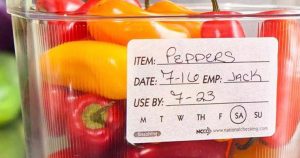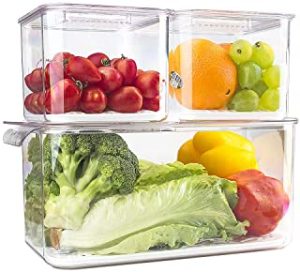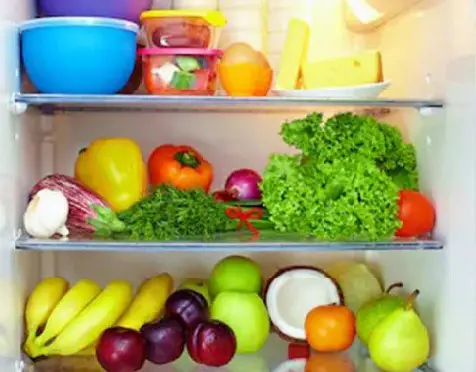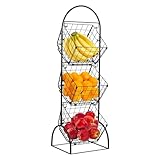Every homeowner should store their vegetables appropriately to prevent any form of food contamination and to ensure that they do not go bad prematurely.
Today, kitchen experts recommend a wide range of techniques that help you store your vegetable in order to keep them fresh for a longer period of time.
Indisputably, most vegetables are perishable hence require extra care during storage. The storage method varies depending on the type of vegetable.
For instance, vegetables like tomatoes require refrigeration. On the flip side, onions and potatoes can get stored in a vegetable rack.
In this article, we look at some of the best ways you can store your vegetables,
What is the best way to store leafy greens?
After purchasing leafy greens from the grocery store, it would be best if you consume them immediately. Leafy greens do not have a long lifespan. Even so, if you wish to store leafy greens, consider the following method.
Place the leafy greens in a paper towel while dry. Fold the paper towel gently to prevent falling of the greens. Then, place the paper towel with the greens in a tightly fitted container. So, if you have kale, spinach, cabbage or lettuce, implement the above storage method.
Note that washing the leafy greens before storage increases the chances of food contamination. Moisture attracts harboring of bacteria. So, when you store leafy greens while damp, they are more likely to accommodate bacteria. It is always advisable to wash leafy greens right before preparing them.
Use a vegetable rack
For vegetables that don’t require freezing, invest in suitable vegetable racks for storage. You can always place your vegetable rack on your kitchen counter or shelf.
Just ensure that the area is free from moisture and any dampness. Moisture present in your vegetables will lead to the accumulation of bacteria hence cause food contamination.
Moreover, it is essential to place your vegetables in places with proper ventilation. When storing your vegetables in the rack, avoid wrapping them in plastic bags. Besides, vegetable racks help you reach your vegetables easily.
Storing tomatoes
As mentioned earlier, tomatoes need to get stored in the fridge. Nonetheless, before you store tomatoes, ensure that they are ripe.
If you buy unripe tomatoes, allow them to ripen at room temperature. Then, you can place them in the fridge. Avoid keeping tomatoes under direct sunlight. Thus, move your vegetable rack from your window.
Storing asparagus to keep them fresh
Another vegetable you should store appropriately is asparagus. Unlike leafy greens, ensure the stalks of asparagus are damp before storing them in a refrigerator. You can wrap the stalks in a wet paper towel.
Alternatively, place the asparagus in a container or bowl full of cold water. Allow the stalks to stay in the water. This is the only way this vegetable remains fresh.
Squash and root vegetable storage techniques
Vegetables like root vegetables thrive in dark, cold, dry places. Unlike most vegetables, squash and root vegetables do not need refrigeration.
So, consider storing such vegetables in the kitchen cabinet or in the vegetable rack. Moreover, vegetables like garlic, onions and pumpkins would also thrive in such conditions.
Place your vegetables in very low temperatures

Aside from storing your vegetables in the refrigerator, it is also advisable to freeze them. In particular, place perishable vegetables in your freezer.
The best thing about freezing is that it retains the nutritional contents of your vegetables. Consequently, you can boost your health. But make sure you blanch your vegetables before freezing them.
All you have to do is boil the vegetable for a maximum of 120 seconds. Then, please place them in cold water immediately. Once you do this, you are safe to store your vegetables. Blanching and freezing your vegetables can make them last for a year.
Even so, note that freezing is not ideal for all vegetables. Avoid placing lettuce, potatoes, eggplants, sprouts and sweet potatoes in the freezer.
How long should I store my vegetables?
Often, the majority of homeowners are always curious to know how long they should leave their vegetables untouched. Well, it depends.
Vegetables are different and tend to have different lifespans. Typically, some rot faster than others. But with the right vegetable storage techniques, your vegetables can last longer.
When you store your vegetables, keep monitoring them to ensure they are in good condition. But you can always extend the lifespan of your vegetables by storing them properly.
Always create a section for your vegetables in the fridge. It would be best if you apportioned the lower part of your refrigerator for vegetables. Here, you can store potatoes, celery, broccoli, carrots.
When storing these vegetables, enclose them in a container. On the other hand, place mushrooms in a plastic bag before storing them in the crisper.
Food labeling with dates can also ensure that you consume older vegetables earlier to protect them from damage.
One thing to note is that you should not mix your fruits and vegetables when storing them in the fridge. Otherwise, your vegetables would ripen quickly and become rancid much faster.
Protect your vegetables in the fridge

Unquestionably, you have to incorporate all techniques to ensure you maximize your vegetables’ lifespan in the fridge. One way to do this is to prevent the growth of mold in the fridge. Ensure that your vegetables receive proper ventilation even when they’re in the fridge.
You can purchase refrigerator crispers with tiny holes to allow air to enter the storage area. In turn, your vegetables can last longer and save you on your monthly grocery budget.
How long can I store canned vegetables?
Nowadays, you can get canned vegetables from the supermarket. Unlike fresh produce, these vegetables can last for months. Thus, they are advantageous if you plan to stock vegetables. Most canned vegetables expire after one to two years. Fascinating, right?
Even so, before consuming canned vegetables, always check the expiry date. Since canned vegetables have preservatives, you can keep them in your kitchen cabinet or drawer.
In turn, you end up saving on your refrigerator space. Even after the expiration date, most canned foods are safe for consumption, but only for a few weeks thereafter.
In summary
At present, there are plenty of ways you can implement to store your vegetables. However, before you incorporate a particular storage technique, ensure you understand the type of vegetable.
Different vegetables required different storage techniques. But one of the significant ways you can store vegetables is in the refrigerator.
Additionally, you can store your vegetables in a vegetable rack on your kitchen counter. All you have to do is ensure that you are using the right storage method for the right vegetables, which will ensure that all your vegetables are in good condition.








